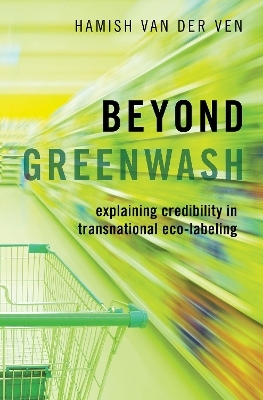
Beyond Greenwash
Explaining Credibility in Transnational Eco-Labeling
Seiten
2019
Oxford University Press Inc (Verlag)
978-0-19-086600-6 (ISBN)
Oxford University Press Inc (Verlag)
978-0-19-086600-6 (ISBN)
From green frogs and blue angels to white bunnies, modern consumers are confronted by a growing array of colorful eco-labels on everything from coffee to computers. When eco-labels are credible, they can lead to dramatic change in environmental practices broadly and quickly by leveraging the purchasing power of corporate clients (e.g., Walmart and McDonalds) to influence global supply chains. But the credibility of such labels is highly variable; and despite the existence of established practices for eco-labeling, many labels remain little more than superficial exercises in "greenwash." How can consumers separate greenwash from genuine attempts to address environmental challenges?
Beyond Greenwash addresses this question by systematically investigating the credibility of transnational eco-labeling organizations across countries and commercial sectors. Using an innovative proxy measure for credibility that examines adherence to established best practices, Hamish van der Ven proposes a novel theory of rigor and credibility in transnational eco-labeling that upends conventional wisdom. He argues that the credibility of an eco-label does not depend on who creates or manages it-whether a government, industry association, professional standard setter, or environmental NGO. Rather, it depends on which types of businesses use the label. More specifically, eco-labeling organizations that target bigger, consumer-facing retailers tend to create credible eco-labels out of a desire to insulate their clients from critical scrutiny and gain acceptance in new markets. This theory challenges the conventional wisdom that only governments or environmental NGOs can create meaningful environmental governance and suggests that who is being governed matters as much, if not more, than who is doing the governing.
Beyond Greenwash addresses this question by systematically investigating the credibility of transnational eco-labeling organizations across countries and commercial sectors. Using an innovative proxy measure for credibility that examines adherence to established best practices, Hamish van der Ven proposes a novel theory of rigor and credibility in transnational eco-labeling that upends conventional wisdom. He argues that the credibility of an eco-label does not depend on who creates or manages it-whether a government, industry association, professional standard setter, or environmental NGO. Rather, it depends on which types of businesses use the label. More specifically, eco-labeling organizations that target bigger, consumer-facing retailers tend to create credible eco-labels out of a desire to insulate their clients from critical scrutiny and gain acceptance in new markets. This theory challenges the conventional wisdom that only governments or environmental NGOs can create meaningful environmental governance and suggests that who is being governed matters as much, if not more, than who is doing the governing.
Hamish van der Ven is an Assistant Professor in the Department of Political Science and School of Environment at McGill University. He teaches and pursues research on the growing role of businesses and civil society groups in global environmental governance. His work has been published in Global Environmental Politics, Review of International Studies, Regulation & Governance, Review of International Political Economy, Global Environmental Change, and several other peer-reviewed journals.
| Erscheinungsdatum | 02.05.2019 |
|---|---|
| Verlagsort | New York |
| Sprache | englisch |
| Maße | 236 x 160 mm |
| Gewicht | 476 g |
| Themenwelt | Naturwissenschaften ► Biologie ► Ökologie / Naturschutz |
| Wirtschaft ► Allgemeines / Lexika | |
| Wirtschaft ► Betriebswirtschaft / Management ► Unternehmensführung / Management | |
| ISBN-10 | 0-19-086600-4 / 0190866004 |
| ISBN-13 | 978-0-19-086600-6 / 9780190866006 |
| Zustand | Neuware |
| Informationen gemäß Produktsicherheitsverordnung (GPSR) | |
| Haben Sie eine Frage zum Produkt? |
Mehr entdecken
aus dem Bereich
aus dem Bereich
Lehrbuch zu Grundlagen, Technologie und Praxis
Buch | Hardcover (2022)
Hanser (Verlag)
34,99 €
Planung · Recht · Verfahren
Buch | Hardcover (2024)
Springer Vieweg (Verlag)
64,99 €


